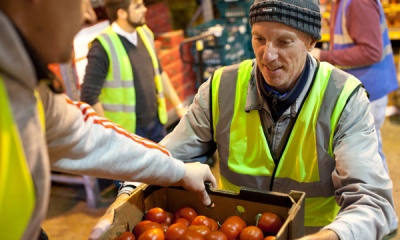FareShare redistributed a record number of meals last year, but it's just 'the tip of the food waste iceberg'

According to the charity’s annual figures for 2015/16, which were released this weekend (11 June), FareShare received a record 9,070 tonnes of food, worth approximately £19.6 million, from retailers and manufacturers including the Co-operative, Asda, Sainsbury’s, Tesco, Kellogg’s and Nestlé, with whom it has partnerships.
The charity works with its partners in the food industry to identify and redistribute in-date, safe-to-eat food that is no longer needed by the retailer.
Often this happens before the food has even reached the shelf, becoming unsuitable for sale for reasons like forecasting errors, mislabelling or having damaged packaging.
Having received the food, FareShare then redistributes it to charities and community groups. Last year, 2,849 charities and groups benefitted from FareShare-collected food, an increase of 29 per cent. These organisations include homeless shelters, children’s breakfast clubs and domestic violence refuges, which are then able to provide nutritious meals for their beneficiaries alongside life-changing support.
According to a survey carried out by NatCen Social Research last year, one in five charities that receives food from FareShare says it would probably or definitely have to close without the supply of food from the charity, while 58 per cent say they would have to reduce the amount of food they provide, and one in four would have to cut back other services.
Enough surplus food in UK to provide 800 million meals a year
FareShare is not the only company to be redistributing surplus food from retailers to charities. Last week, Marks & Spencer (M&S) stated in its ‘Plan A’ annual sustainability report that its collaboration with neighbourly, a social network and mobile app that connects charities that want surplus food with the companies that produce it, had played a large part in reducing its stores’ food waste by nine per cent.

“Demand for surplus food is outstripping supply. FareShare has 20 regional centres around the UK, and every one of them has a waiting list of charities that need food. We’re urgently calling for more food companies to work with us to redistribute their good, surplus produce, and for more volunteers to help us get that food to the people who need it most.”
According to the charity, if 25 per cent of the UK’s surplus food was redistributed to charities and community groups, it would save the voluntary sector up to £250 million per year.
France and Italy leading the way on food waste action
In France, a law was unanimously passed in the Senate earlier this year that requires all supermarkets measuring over 400 square metres to sign an agreement with one or more organisations to redistribute unused food. Any retailers found not to be adhering to the measures will face fines of up to €75,000 (£54,000).
Measures included in the law also put in place a hierarchy to recover value from the food, with prevention and redistribution at the top and animal feed and energy recovery at the bottom, while supermarkets will be made to promote the cutting of food waste in school education projects and corporate responsibility programmes.
Similar action has been taken in Italy, where a bill supporting food waste distribution from supermarkets has been strongly supported across the government’s political parties.
Unlike in France, the bill does not intend to punish retailers that do not redistribute, but aid them to do so, reducing the administrative burden on food donations and offering cuts in taxes proportionate to the amount of food redistributed.
At the moment, red tape inhibits food stores from donating excess product as each donation must be declared in advance. Should the law be agreed by the Senate, retailers will only have to complete one monthly form setting out all donations made.
UK Food Waste Bill faces hurdles
Attempts to get a Food Waste Bill heard in Parliament in the UK have so far been unsuccessful, with Shadow Environment Secretary Kerry McCarthy’s bill falling down the order of parliamentary proceedings since being granted a second reading in September.
 McCarthy’s bill would mirror the French law in obligating supermarkets to donate unsold foods to charities, as well as publishing food waste arisings in the food manufacture supply chain and concentrating on enforcing the food waste hierarchy through incentives.
McCarthy’s bill would mirror the French law in obligating supermarkets to donate unsold foods to charities, as well as publishing food waste arisings in the food manufacture supply chain and concentrating on enforcing the food waste hierarchy through incentives.
The bill would require all large UK supermarkets and manufacturers to reduce their food waste by no less than 30 per cent by 2025, but it is thought that the government prefers the voluntary approach taken by the Waste & Resources Action Programme’s (WRAP) Courtauld Commitment 2025, which challenges its signatories from the UK food and drinks industry to reduce food and drink waste by 20 per cent by 2025.
Food waste campaigner Tristram Stuart, who served as Chief Advisor to TV chef Hugh Fearnley-Whittingstall’s War on Waste programme, says that not enough has been done to promote McCarthy’s bill. He told those attending an event last month: “I feel a real culpability, I think we could do more to raise awareness of it with the British public and are not out campaigning for it. I don’t think the UK is going to do it but France has, and there are governments all over the world taking legislative action on food waste.”
Learn more about the worldwide problem of food waste in Resource’s feature article.









